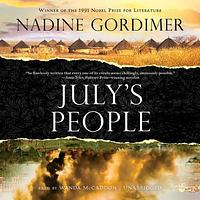Take a photo of a barcode or cover
This is so specifically South African and yet so prescient to so much racial discourse today, so contemporaneous in concern yet timeless in a surreal way. Gordimer writes with such feverish precision to the point of curating a convergence of prosaic tranquility and political rage that transported me in a way The Betrothed could not for Maureen. But, alas, my destination cannot remotely be considered escapist literary vacationing. Gordimer's dissection of the complexities of white liberalism, of the gaps between white and black South Africans, of the multiplicity of the black consciousness, of a South Africa burning and crumbling under the heat of apartheid. This feels both politically and literarily essential as a take on speculative fiction I have never seen prior. Wonderful.
The story is about a white family who escape a civil war by the help of their faithful servant who shelters them from the angry and revenge-seeking black population of South Africa.
The story, which in itself was good, was very difficult to follow. The disjointed writing style and the countless use of parentheses made it almost unreadable.
Frequently I had to go back and read a sentence again to understand what was said and half the time I remained confused with a headache to boot.
The book read like a composition written by a 15 year old who likes to use big words, adverbs and adjectives, but doesn’t know how to arrange them in a coherent manner.
And in my opinion, use of parentheses, is a very lazy style and escape method.
The followings are excerpts:
Once, she knew-she always knew-her husband was awake although still breathing stertorously as a drunk. She heard herself speak. -Where is it?- She was seeing, feeling herself contained by the vehicle.
.................................................
It began prosaically weirdly. The strikes of 1980 had dragged on, one inspired or brought about by solidarity with another until the walkout and the shut-down were lived with as contiguous and continuous phenomena rather than industrial chaos. While the government continued to compose concessions to the black trade unions exquisitely worded to conceal exactly concomitant restrictions, the black workers concerned went hungry, angry, and workless anyway, and the shop-floor was often all that was left of burned-out factories.
................................................
July's knowledge or instinct that in country dorps the black petrol attendants often live in sheds behind the garage-and-general-store complex-on that they had kept going, on and on, although they had left with only enough fuel to take them less than half way…How that load of human beings with the haphazard few possessions there was time to take along (the bag of oranges Maureen had run back to fetch from the kitchen, the radio Bam remembered so that they could hear what was happening behind them as they fled) could hope to arrive at the destination placed before them-that was an impossibility from minute to minute.
....................................................
And this one was one of the most headache-inducing of all:
There was the risk that if, as he seemed to assume, he could reconcile them to the strange presence of whites in their midst and keep their mouths shut, he could not prevent other people, living scattered round about, who knew the look of every thorn-bush, from discovering there were thorn-bushes that overgrew a white man's car, and passing on that information to any black army patrol. If not acting upon it themselves?
The story, which in itself was good, was very difficult to follow. The disjointed writing style and the countless use of parentheses made it almost unreadable.
Frequently I had to go back and read a sentence again to understand what was said and half the time I remained confused with a headache to boot.
The book read like a composition written by a 15 year old who likes to use big words, adverbs and adjectives, but doesn’t know how to arrange them in a coherent manner.
And in my opinion, use of parentheses, is a very lazy style and escape method.
The followings are excerpts:
Once, she knew-she always knew-her husband was awake although still breathing stertorously as a drunk. She heard herself speak. -Where is it?- She was seeing, feeling herself contained by the vehicle.
.................................................
It began prosaically weirdly. The strikes of 1980 had dragged on, one inspired or brought about by solidarity with another until the walkout and the shut-down were lived with as contiguous and continuous phenomena rather than industrial chaos. While the government continued to compose concessions to the black trade unions exquisitely worded to conceal exactly concomitant restrictions, the black workers concerned went hungry, angry, and workless anyway, and the shop-floor was often all that was left of burned-out factories.
................................................
July's knowledge or instinct that in country dorps the black petrol attendants often live in sheds behind the garage-and-general-store complex-on that they had kept going, on and on, although they had left with only enough fuel to take them less than half way…How that load of human beings with the haphazard few possessions there was time to take along (the bag of oranges Maureen had run back to fetch from the kitchen, the radio Bam remembered so that they could hear what was happening behind them as they fled) could hope to arrive at the destination placed before them-that was an impossibility from minute to minute.
....................................................
And this one was one of the most headache-inducing of all:
There was the risk that if, as he seemed to assume, he could reconcile them to the strange presence of whites in their midst and keep their mouths shut, he could not prevent other people, living scattered round about, who knew the look of every thorn-bush, from discovering there were thorn-bushes that overgrew a white man's car, and passing on that information to any black army patrol. If not acting upon it themselves?
Gordimer construye una novela a partir de los conflictos raciales de Sudáfrica —el momento en el que la escribió vivía en el appertheid—. Las tensiones raciales han llegado a tal grado que la familia Smales huye en su bakkie a los bush con July, su jardinero. Ahí conocen a la familia de July y las condiciones en las que viven, a las que ellos también se acostumbraran, descubren que el precario equilibrio en el que los blancos se mantenían en el poder —y del que ellos se beneficiaban— se ha desvanecido. Maureen, la mujer, descubre, también, a ver a July como un ser humano, con sus contradicciones, y no solo como un sirviente. Escrito con una prosa potente y no exenta de lirismo.
had it for my English syllabus, but this was an amazing read! the writing was so descriptive and fun to read! It shines a light into the terrifying, schemes of conflict between black and white people in a divided South Africa.
I'm in love w Nadine Gordimer's writing, I'd definitely read more books of hers in the future!
I'm in love w Nadine Gordimer's writing, I'd definitely read more books of hers in the future!
“you like to have some cup of tea?-July bent at the doorway and began that day for them as his kind has always done for their kind.
A great read about that relationship that exists between haves and have-nots. Nadine Gordimer draws a picture of what would have happened, had the civil war took place. Her white characters were actually liberals and treated their servant, July fairly:
"..... master he say can I come in? and they have tried to train him to drop the 'master' for the ubiquitously respectful 'sir'
However it is easy for people to assume that they are treating others fairly. Even after fifteen years of July's working for them, they still didn't know July's real name.
When the civil war came, he rescued them to his place. July took to providing for them. He didn't trust them to look after themselves. At first, he still kept his servant like habits even now when his employers had nothing to pay him with and were actually dependent on him.
With time however, there are changes in July's attitude. He start taking small liberties. He is frustrated that he has to maintain them. From than on it becomes a sort of allegory of reign changes that would happen when blacks take over the South Africa.
A good way to understand things is to disturb them a little and see what happens. When White people are taken out of their comfort zones, the racial discrimination and economic gaps existing in societies become stark clear.
Another thing which struck me is that there are no scenes of violence at all; given the war settings of book and tensions in between people. Gordimer delivers her message subtly, though the book still managed to get banned.
A great read about that relationship that exists between haves and have-nots. Nadine Gordimer draws a picture of what would have happened, had the civil war took place. Her white characters were actually liberals and treated their servant, July fairly:
"..... master he say can I come in? and they have tried to train him to drop the 'master' for the ubiquitously respectful 'sir'
However it is easy for people to assume that they are treating others fairly. Even after fifteen years of July's working for them, they still didn't know July's real name.
When the civil war came, he rescued them to his place. July took to providing for them. He didn't trust them to look after themselves. At first, he still kept his servant like habits even now when his employers had nothing to pay him with and were actually dependent on him.
With time however, there are changes in July's attitude. He start taking small liberties. He is frustrated that he has to maintain them. From than on it becomes a sort of allegory of reign changes that would happen when blacks take over the South Africa.
A good way to understand things is to disturb them a little and see what happens. When White people are taken out of their comfort zones, the racial discrimination and economic gaps existing in societies become stark clear.
Another thing which struck me is that there are no scenes of violence at all; given the war settings of book and tensions in between people. Gordimer delivers her message subtly, though the book still managed to get banned.
challenging
reflective
medium-paced
Plot or Character Driven:
Character
Strong character development:
Yes
Loveable characters:
Complicated
Diverse cast of characters:
Yes
Flaws of characters a main focus:
Yes
challenging
reflective
slow-paced
Plot or Character Driven:
Character
Loveable characters:
No
Diverse cast of characters:
Yes
challenging
reflective
tense
slow-paced
Plot or Character Driven:
Character
Strong character development:
Complicated
Loveable characters:
Complicated
Diverse cast of characters:
Complicated
Flaws of characters a main focus:
Yes
Read immediately after Noami Alderman's The Power. The two books share quite a lot thematically about the nature of power and the societal structures that support/deny it.
challenging
emotional
mysterious
reflective
Plot or Character Driven:
Character




